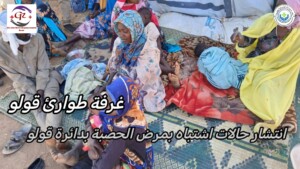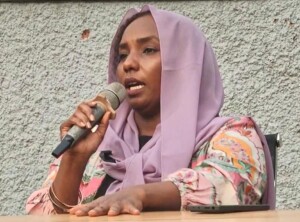Sudan Health Ministry acknowledges 800 deaths from ‘watery diarrhoea’, in 2017
Sudan’s Health Minister Mohamed Abuzeid has acknowledged that 800 out 36,000 cases infected with acute watery diarrhoea resulted in fatalities last year.
 How to prevent the spread of cholera (Sudanese Doctors' Union)
How to prevent the spread of cholera (Sudanese Doctors' Union)
Sudan’s Health Minister Mohamed Abuzeid has acknowledged that 800 out 36,000 cases infected with acute watery diarrhoea resulted in fatalities last year.
He attributed the death toll to a slowdown in environmental and health safety. The Minister said that one of the most serious environmental phenomenon facing Sudan is people using the open as a toilet, in which Sudan ranks in the fourth place in Africa.
Suspected cholera
Sudan has experienced an epidemic since 2016 which the Sudanese government insists on calling ‘watery diarrhoea’ in spite of numerous independent confirmations (conducted according to WHO standards) that the disease which broke out in Blue Nile state in August 2016 was cholera, the Sudanese authorities and several international organisations persistently refer to it as ‘acute watery diarrhoea’.
The WHO and the Sudanese Ministry of Health reported in mid-October that the total number of recorded cases reached more than 35,000 people – including 800 related deaths. Doctors of Sudan’s National Epidemiological Corporation reported in early July however, that nearly 24,000 Sudanese had been infected and 940 cholera patients died.
In May, Sudan’s federal Minister of Health, declared that Sudan is now free of the 'watery diarrhoea' outbreak (suspected to be cholera) that hit various parts of the country during the past year.
Regional consultation
Yesterday, a regional meeting was held in Khartoum with the participation of five neighbouring countries of Sudan for the first time in 20 years, talking about cross-border health security and how to deal with pandemics and cross-border public health threats.
The regional meeting was organised by the Ministry of Health in cooperation with the World Health Organisation (WHO) with the participation of the Ministers of Health of South Sudan, Ethiopia, Libya, Egypt and Chad.
Minister Abuzeid said that the meeting aims to analyse the current situation of public health challenges related to borders and discuss the strengths, challenges and opportunities of cooperation across borders to meet these challenges and future cooperation mechanisms, as well as adopting Khartoum Declaration to support public health challenges across borders and ways of cooperation.
Follow #CholeraInSudan, #الكوليرا_السودان for ongoing coverage by Radio Dabanga











 and then
and then